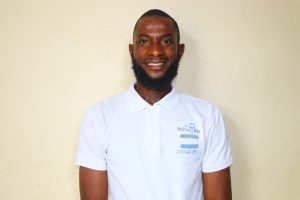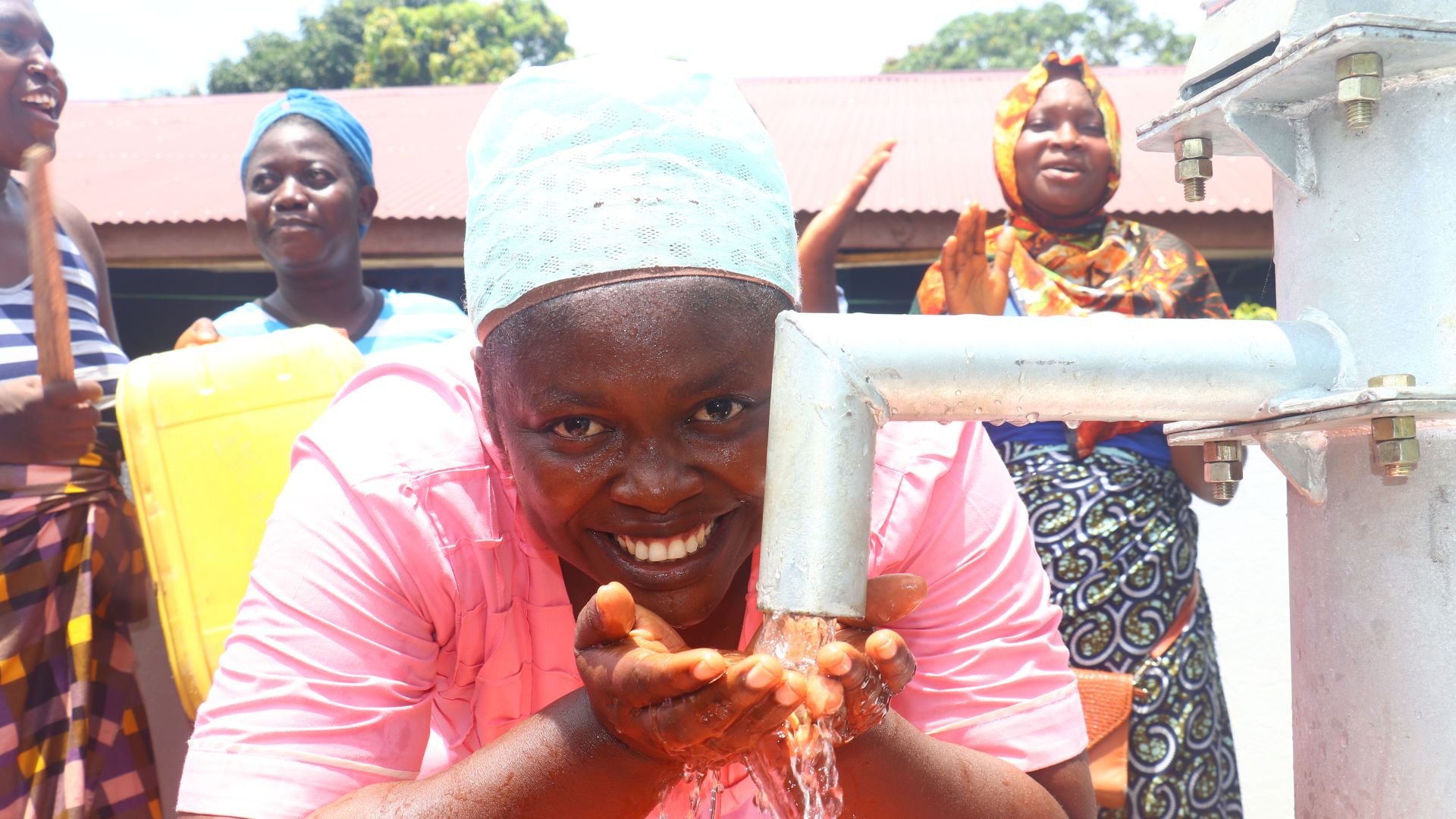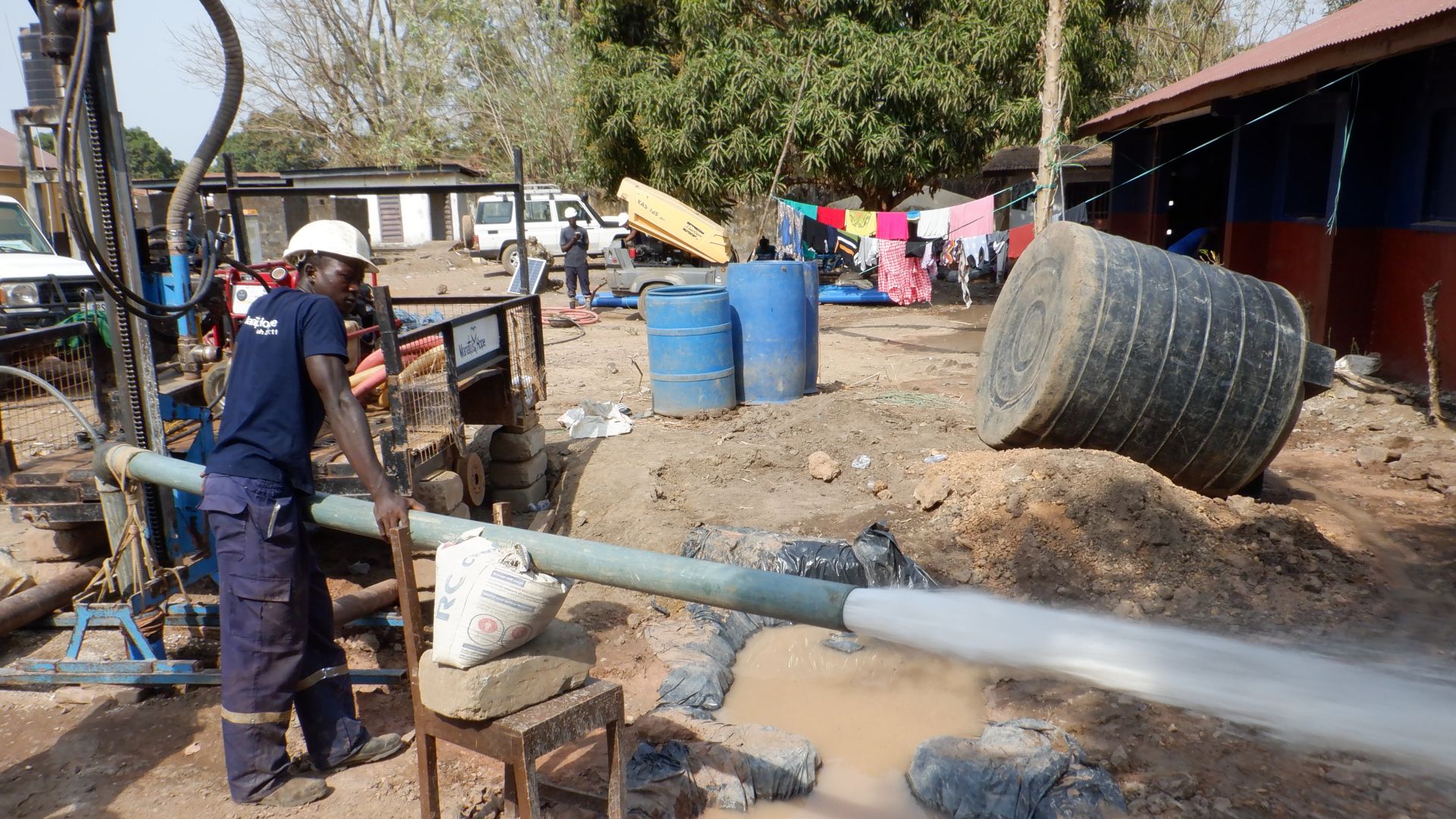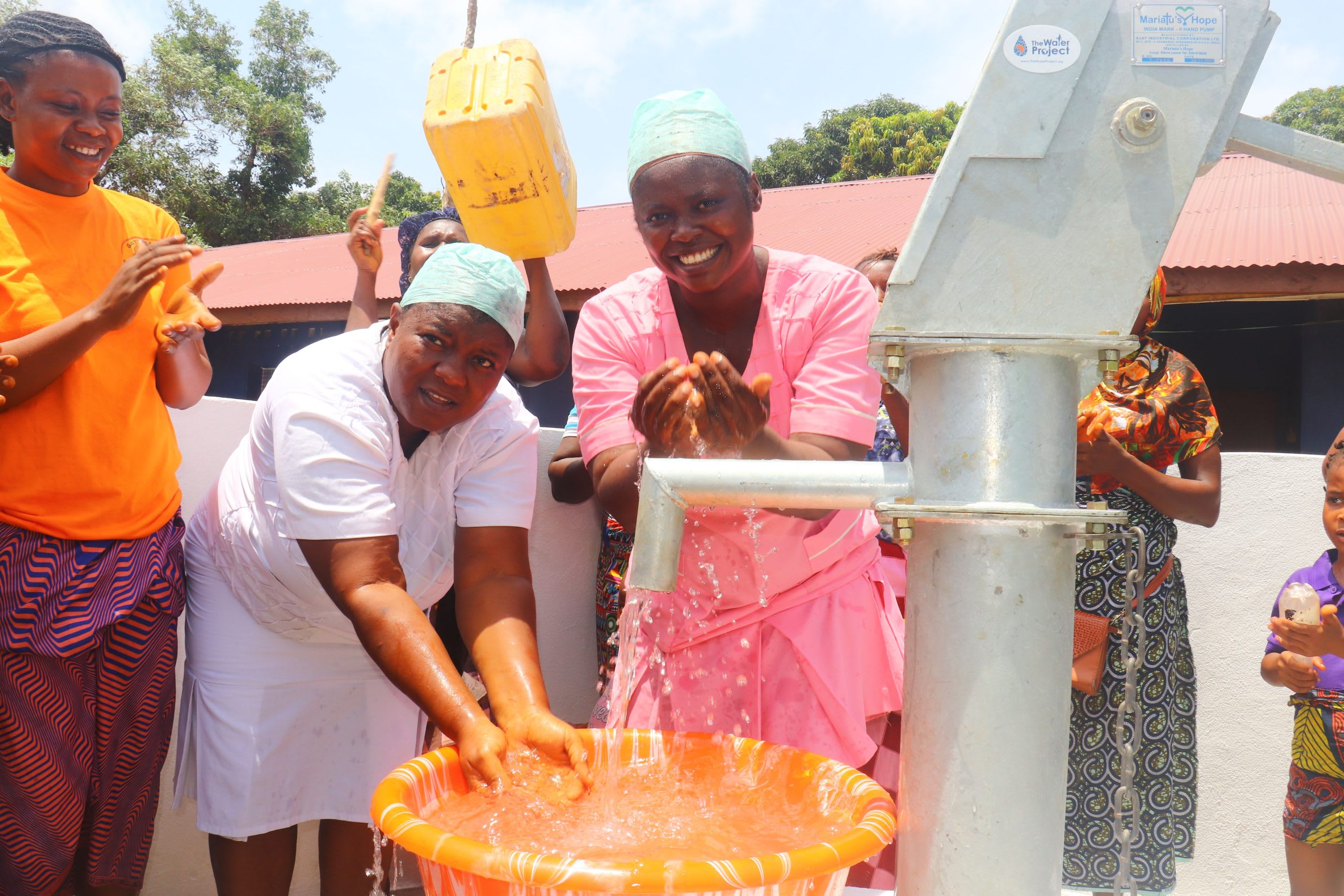The 14 Pepel Community Health Center staff care for an average of 40 patients a day, which is incredibly challenging as they have limited space, no overhead lighting, and experience daily water scarcity.

The Pepel Community Health Center.
The well at the center experiences frequent breakdowns that are expensive and difficult to repair. When the well does not offer water, the only option is to travel to another well in a neighboring community. Nurses often travel more than thirty minutes to collect water, stealing time from patients needing care.

Traveling for water.
Field Officer Alie Kamara shared, "This facility has [a] U-5 unit for treating children, [an] EPI unit to store vaccines, Labor and Delivery for caring [for] pregnant women and general cases. This facility serves people in the environs and has a catchment population of 8,750. They have a freezer powered by solar, which was used to store vaccines. They use different vaccines like BCG, Polio, Malaria, OPV, Rota, Penta, measles, etc."

Maternity Ward.
"Moreover, this facility faces challenges like electricity, not enough buildings, water access, [and] latrines. Presently, there is no light system in the facility, and they find it difficult to see cases, especially when pregnant women come into the facility for labor; in most cases, they see deliveries at night. Water access in this facility [is] another challenge; their present well has been down for years, and they tried to repair it but could not," Alie continued.

The broken-down well is in need of rehabilitation.
The Pepel Community Health Center has to work twice as hard to give their patients the quality of care they deserve.
36-year-old nurse Isatu Conteh works through this challenge every day. So much of her time is consumed by water collection that she couldn't quantify it when asked.

Nurse Isatu Conteh.
"I cannot tell the exact time I used to reach the water source, especially the well that [is] located far away from the health facility. Sometimes, when the well that is close to us gets locked, I prefer walking long distances to access another water well, which takes time before I [can] return. Due to the distance, it takes me so long to reach the well and return [to] the health facility."
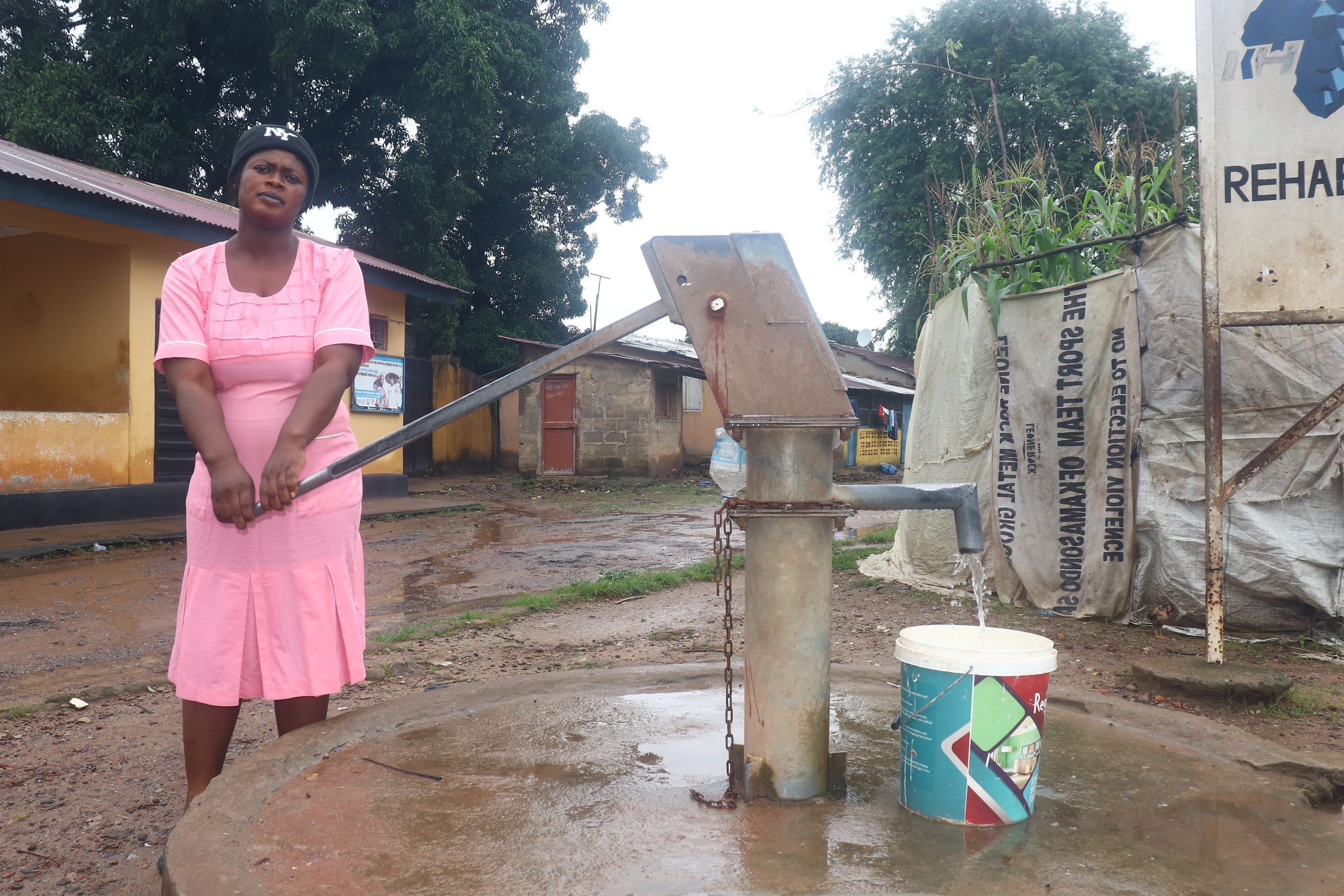 Nurse Isatu Conteh at a well outside of the healthcare center.
Nurse Isatu Conteh at a well outside of the healthcare center.
"Water plays a role in my daily life. My profession as a nurse cannot be performed effectively without water. So, water is needed for me to be able to do deliveries [for] pregnant women. The well we fetch water from is not always open to us. It is a community well and they get ownership of that well. So, it [is] difficult for us to fetch water from it mostly at the times [when] we need it, especially labor cases at night. All this makes us not fetch enough water, especially when the well gets overcrowded," Isatu shared.
Without water, proper healthcare can't be accomplished. The dedicated doctors and nurses need a different solution. They need access to reliable water. Rehabilitating the well at the Pepel Community Health Center will give Isata the tools she needs to provide the excellent patient care she can.
Steps Toward a Solution
Our technical experts worked with the local community to identify the most effective solution to their water crisis. They decided to drill a borehole well, construct a platform for the well, and attach a hand pump.
Well
Abundant water often lies just beneath our feet. Aquifers—natural underground rivers—flow through layers of sediment and rock, offering a constant supply of safe water. A borehole well is drilled deep into the earth to access this naturally filtered and protected water. We penetrate meters, sometimes even hundreds of meters, of soil, silt, rock, and more to reach the water underground. Once found, we construct a platform for the well and attach a hand pump. The community gains a safe, enclosed water source capable of providing approximately five gallons of water per minute. Learn more here!
What Makes This Project Unique
Each project has its own unique needs. This project, in particular, showcases collaboration and ingenuity, as two water sources will work together to ensure uninterrupted access.
The facility currently has two non-functional waterpoints on its grounds: a protected dug well with a hand pump and an electrical submersible pump that fills a 5,000-liter storage tank. This stored water is then distributed by gravity to taps throughout the community health center, providing access for both patients and staff. Due to the non-functionality of both waterpoints, they have faced challenges in accessing sufficient clean water, limiting the level of care they can provide.
The plan is to drill a new borehole to supply both a solar-powered submersible pump and a handpump. The solar-powered submersible pump will refill the existing 5,000-liter storage tank, thereby restoring access to the facility's gravity-fed water distribution system. The borehole will also be fitted with a handpump to provide the Pepel Health Center's staff and patients with access to water outside of the treatment areas.
Why Do Both?
The combination of piped water and handpump creates a more resilient system of water access for the healthcare facility. Healthcare providers get dedicated access to in-clinic sinks for critical medical needs, while patients and other staff benefit from a convenient handpump location. This dual approach reduces wait times, ensures backup coverage, and meets the distinct needs of both medical staff and the people accessing healthcare—delivering reliable water access when and where it's needed most.
Health Center Education & Ownership
Hygiene and sanitation training are integral to our water projects. Training is tailored to each health center's specific needs and includes key topics such as proper water handling, improved hygiene and sanitation practices, disease transmission prevention, and care of the new water point. The health center staff assumes responsibility for maintaining the water point, promoting safe hygiene and sanitation practices, and keeping handwashing stations well-stocked. After training, the local nurses and community health officers, encouraged and supported by our team's guidance, will provide community training.
Safe water and improved hygiene habits foster a healthier future for the entire community.

 Borehole Well and Hand Pump
Borehole Well and Hand Pump









